![Top Checkmarx alternatives and competitors [September 2025] Top Checkmarx alternatives and competitors [September 2025]](/blog/images/top-checkmarx-alternatives.webp)
For more than two decades, Checkmarx has been a key player in application security. It offers a broad platform spanning static application security testing (SAST), dynamic application security testing (DAST), software composition analysis (SCA), infrastructure-as-code (IaC) security, container security, and API protection. By combining these capabilities, Checkmarx has positioned itself as a one-stop solution for enterprises that want centralized visibility and control over their security posture.
But in 2025, organizations face growing demands that are reshaping how they think about security tooling. While Checkmarx provides broad coverage, many engineering leaders are seeking alternatives due to:
High licensing costs that make scaling difficult for startups and mid-market firms
Complex deployment and onboarding processes for hybrid environments
Limited developer-friendly workflows compared to newer, agile competitors
The need for specialized solutions that excel in specific categories such as API security, Kubernetes-native protection, or AI-powered testing
This blog explores the best Checkmarx alternatives in 2025, broken down by security category. Whether you need better support for modern applications, faster integration into CI/CD workflows, or more cost-effective vulnerability management, these alternatives offer strong choices tailored to different organizational needs.
Best Checkmarx alternatives at a glance
| Software | Pricing (starting) | Strengths | Best for |
|---|---|---|---|
| Beagle Security | $119/month | AI-powered DAST, no false positives, CI/CD integration | Modern web apps & APIs, DevSecOps teams |
| Invicti | Starts at approx. $37,000/year | Proof-based scanning, enterprise scalability | Large enterprises needing scalable DAST |
| Snyk | $98/month (per developer) | Developer-first SAST, wide integrations | Engineering teams wanting shift-left security |
| SonarQube | Free (Community) / $35/month (Developer Edition) | Code quality + SAST combined | Teams balancing security and code quality |
| Mend.io | $16000/year | Strong SCA coverage, license risk management | Orgs focused on open-source risk |
| Veracode SCA | $600-$2800/year | Enterprise-grade SCA with deep reporting | Large organizations needing compliance |
| Trivy | Free | Lightweight IaC & container scanning | Developers looking for fast local scanning |
| Checkov | Free | IaC scanning with strong policy-as-code | Teams adopting IaC in cloud-native setups |
| Aqua Security | $50,000/year | Kubernetes-native, container runtime protection | Container-heavy enterprises |
| Lacework | Starts from $25000/year | Cloud-native threat detection, compliance | Enterprises scaling multi-cloud |
| Traceable AI | Starts from $20000/year | API discovery, runtime protection | Enterprises with complex API ecosystems |
Checkmarx DAST alternatives
Checkmarx DAST overview: Strengths and limitations
Checkmarx DAST helps organizations identify vulnerabilities in running web applications and APIs. It covers common issues such as SQL injection, cross-site scripting (XSS), and authentication flaws. The tool integrates with the broader Checkmarx suite, providing consolidated reports.
Strengths:
Comprehensive coverage of OWASP Top 10 vulnerabilities
Integration with Checkmarx SAST and SCA for unified reporting
Enterprise-focused dashboards and compliance reporting
Limitations:
Struggles with modern frameworks and SPAs without manual tuning
API security support is weaker compared to specialized solutions
High licensing costs compared to leaner DAST providers
Less intuitive developer experience, requiring security teams to manage findings
Due to these challenges, many organizations explore alternatives that provide a more developer-friendly experience, lower costs, and better modern application coverage.
Beagle Security
Beagle Security is one of the most popular Checkmarx DAST alternatives, designed to provide developer-first application testing. Its AI-driven penetration testing engine simulates real-world attacker behavior, validating each finding before reporting it. This approach drastically reduces false positives, a major pain point with traditional scanners.
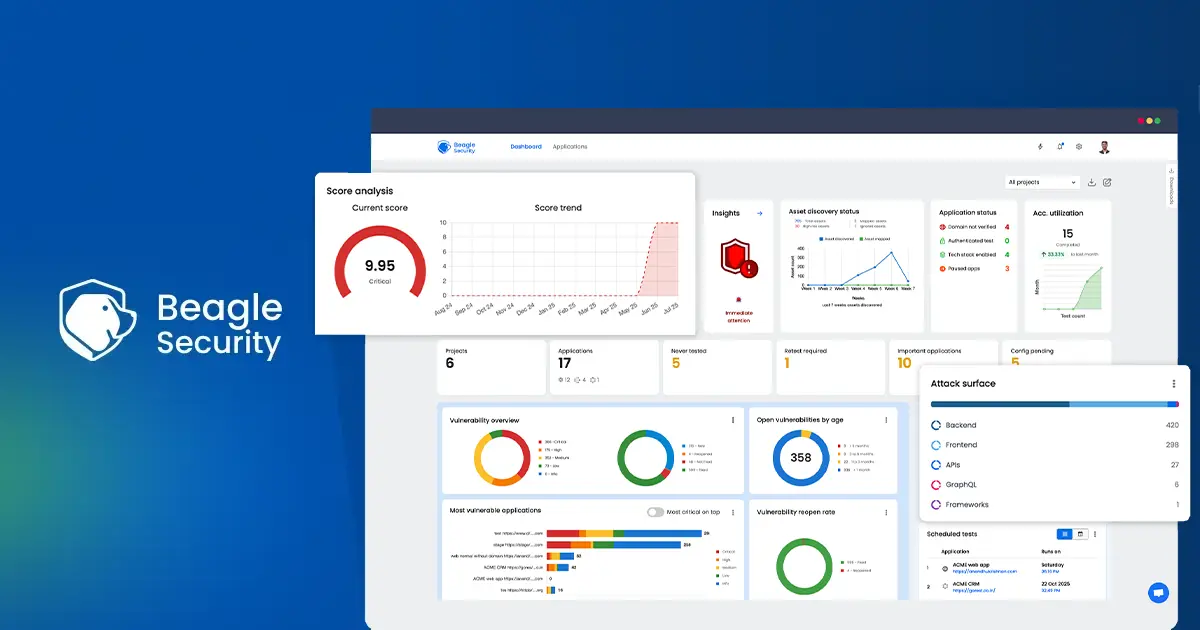
Beagle Security supports single-page applications (SPAs), REST and GraphQL APIs, and authentication workflows. It goes further by testing for business logic flaws, which often go undetected by automated scanners. Reports are tailored for developers, with clear, stack-specific remediation steps and compliance mappings for standards such as PCI DSS, HIPAA, and ISO.
Key features:
AI-powered attack simulations for apps and APIs
Business logic testing beyond common vulnerabilities
Compliance-ready reports aligned with OWASP, HIPAA, PCI DSS
Seamless CI/CD integration for continuous security testing
Zero false positives through validated results
Pricing:
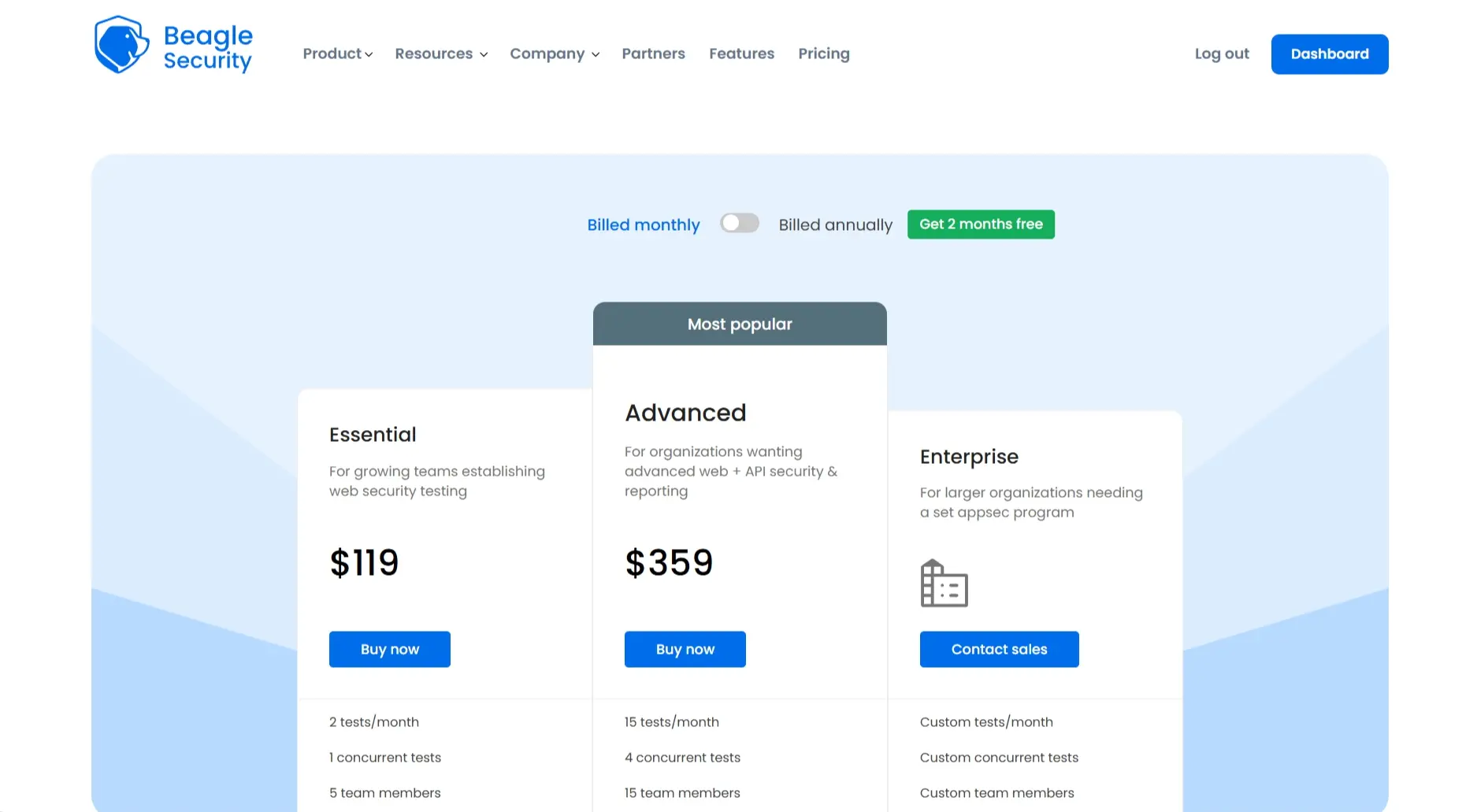
Essential plan: $119/month (2 tests/month).
Advanced plan: $359/month (15 tests/month).
Enterprise plan: Starting at approximately $6,850/year with custom options.
Ratings & reviews:
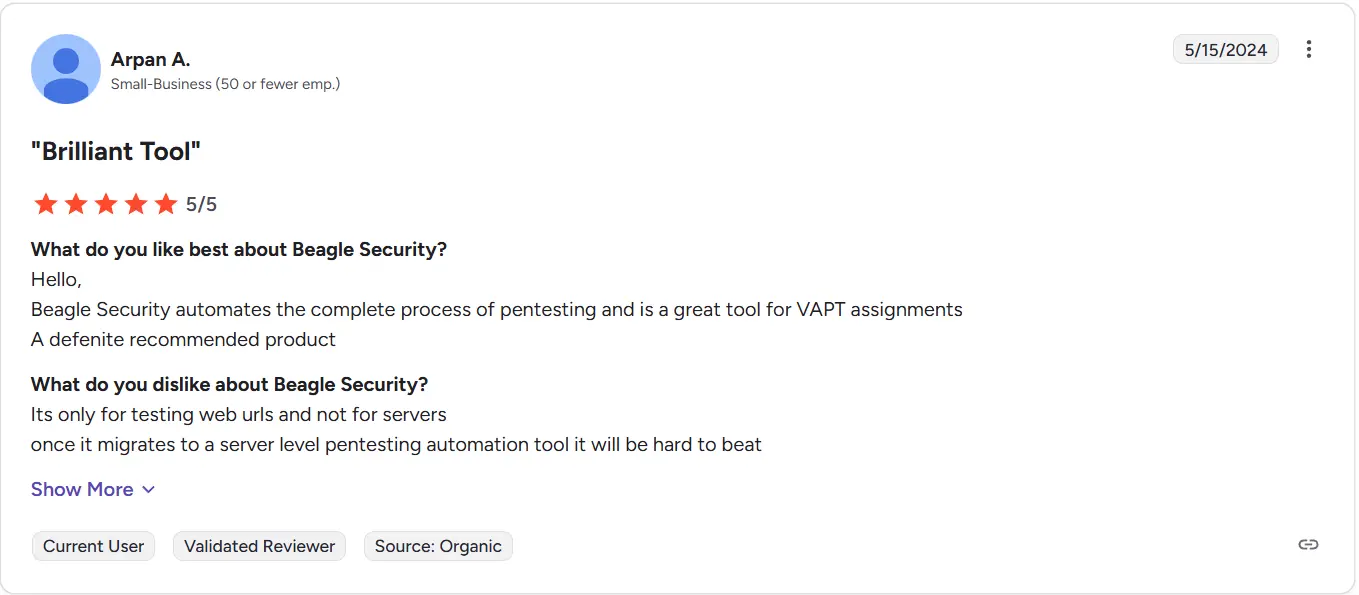
Source: G2
Beagle Security holds an average rating of 4.7/5. Users consistently highlight its ease of setup, intuitive reporting, and strong support. Many note that the validated findings save developer time, while the compliance-ready reports are useful for security leaders. A few reviewers mention that larger enterprises may need advanced customization, but overall satisfaction remains high across SMBs and mid-market companies.
Invicti
Invicti, formerly known as Netsparker, is a DAST tool designed for large-scale enterprise environments. Its proof-based scanning verifies vulnerabilities safely, ensuring that security teams can trust the results without manually validating every finding.
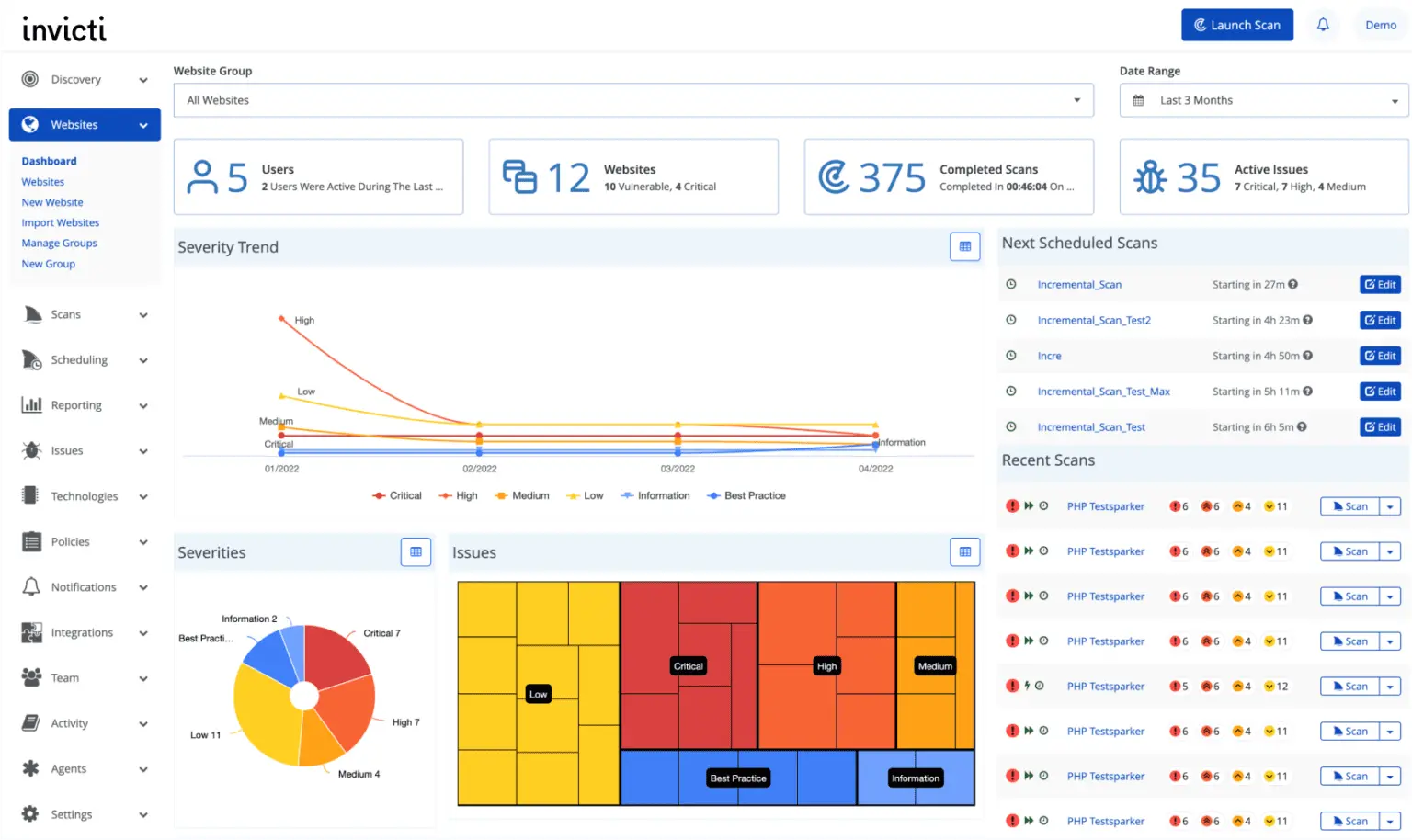
The tool supports both cloud and on-premise deployments, offers centralized management, and integrates with CI/CD workflows. It is especially strong for organizations that need to manage hundreds of applications while keeping false positives low.
Key features:
Proof-based scanning to confirm vulnerabilities
Centralized dashboards with role-based access
Flexible deployment: cloud or on-premises
Compliance reporting for enterprise standards
Scales effectively for large organizations
Pricing:
Essentials package: Available by custom quote (unlimited coverage, proof-based scanning, CI/CD and ticketing integrations).
License types available: Standard, Team (Standard + Enterprise), and Enterprise (self-hosted or on-prem), with website-based quota; pricing provided on request, starting from $37,000/year.
Ratings & reviews :
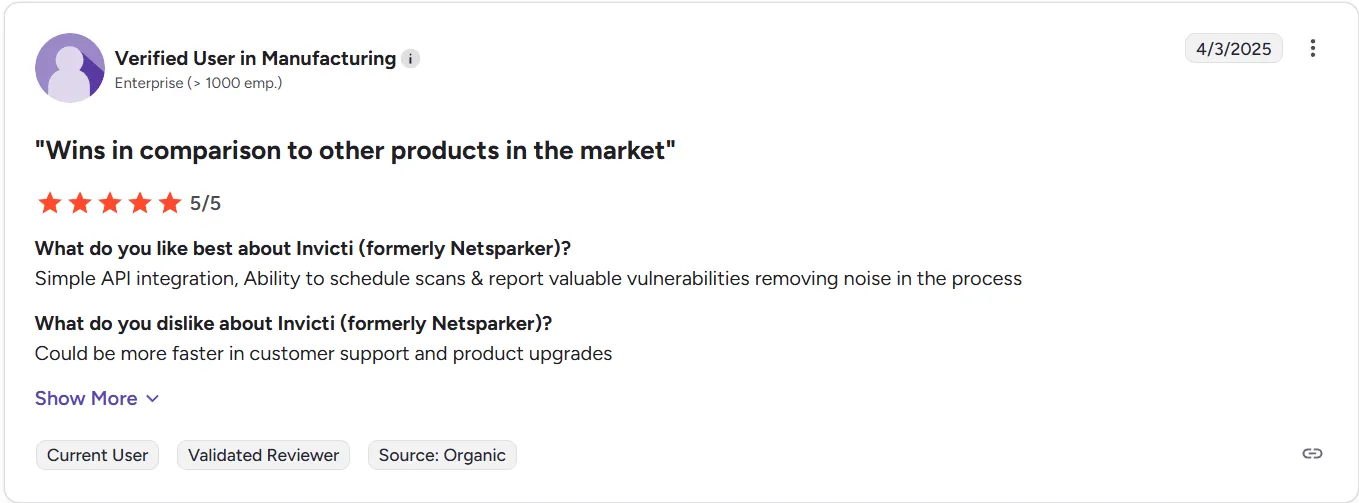
Source: G2
Invicti holds an average rating of 4.6/5. Users praise its accuracy and scalability, with many noting that proof-based scanning reduces validation overhead. Security teams value the reporting depth and compliance support, though some reviews mention that configuration can take time for very large environments. Overall, it is widely considered a reliable enterprise-grade DAST platform.
Checkmarx SAST alternatives
Checkmarx SAST overview: Strengths and limitations
Checkmarx SAST is one of its most widely used offerings, analyzing source code for vulnerabilities during development. It integrates with major IDEs and CI/CD tools, allowing teams to identify risks early in the development cycle.
Strengths:
Broad language support covering most modern programming languages
Integration with Checkmarx SCA for open-source security visibility
Strong adoption among large enterprises for shift-left security
Compliance-oriented reporting for regulatory standards
Limitations:
Licensing costs scale poorly for mid-sized teams
Scans can be slow for large codebases, impacting developer velocity
Results may generate false positives without careful tuning
Reports can be overwhelming for developers without security expertise
Because of these drawbacks, many engineering teams adopt alternative tools that offer faster scans, better developer experiences, and more affordable pricing models.
Snyk
Snyk has become one of the leading developer-first SAST alternatives to Checkmarx. Unlike traditional platforms, Snyk focuses on making security approachable for developers by integrating directly into IDEs, Git repositories, and CI/CD workflows.
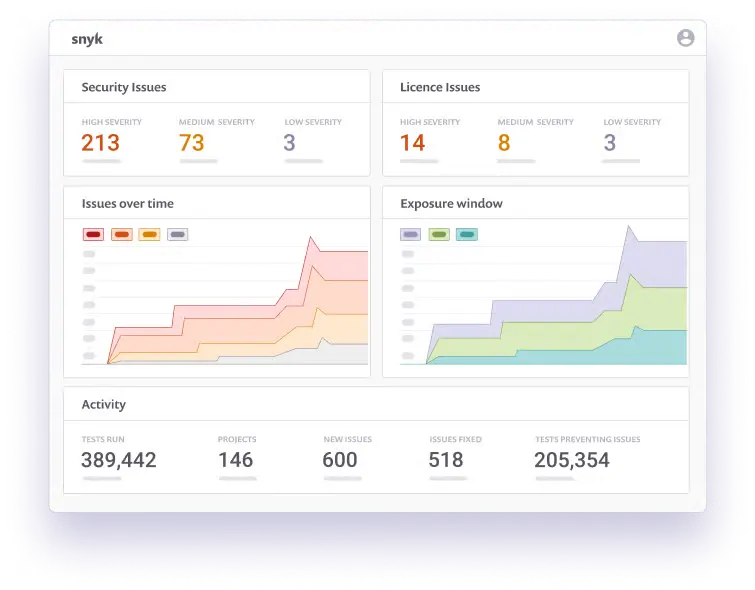
It provides rapid scanning for vulnerabilities in source code, open-source dependencies, containers, and IaC, creating a unified developer security platform. Snyk’s reporting emphasizes remediation, with clear fix recommendations that developers can apply directly in their workflows.
Key features:
Fast, developer-friendly static code scanning
Broad integration across IDEs and CI/CD pipelines
Unified platform covering code, open-source, containers, and IaC
Clear, actionable remediation guidance
Strong ecosystem of plugins and integrations
Pricing:
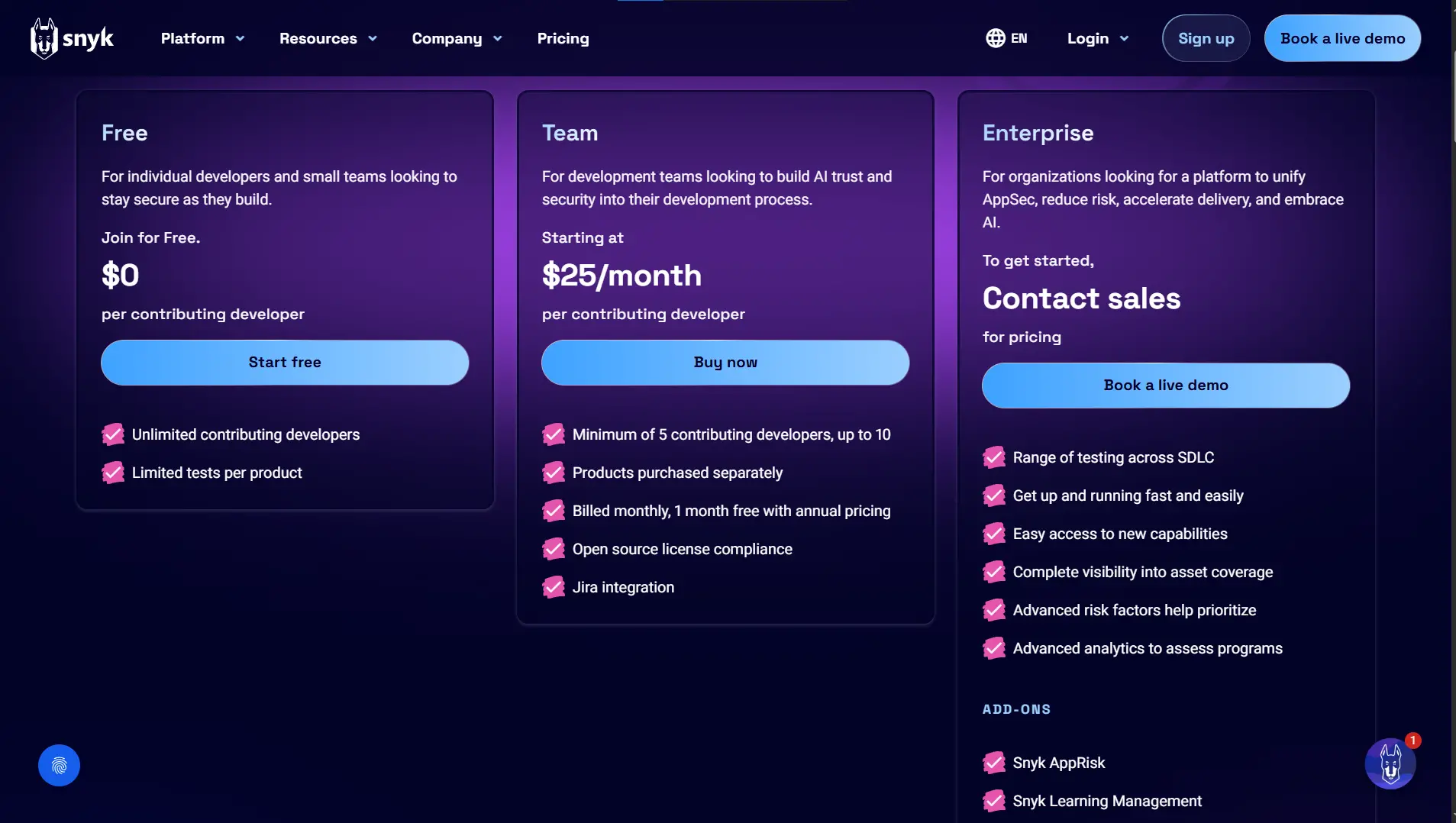
Free Plan: $0 per contributing developer with unlimited developers but limited tests per product.
Team Plan: $25/month per contributing developer with a minimum of 5 developers, up to 10 max.
Enterprise Plan: Custom pricing through sales contact for organizations needing advanced features.
Ratings & reviews:
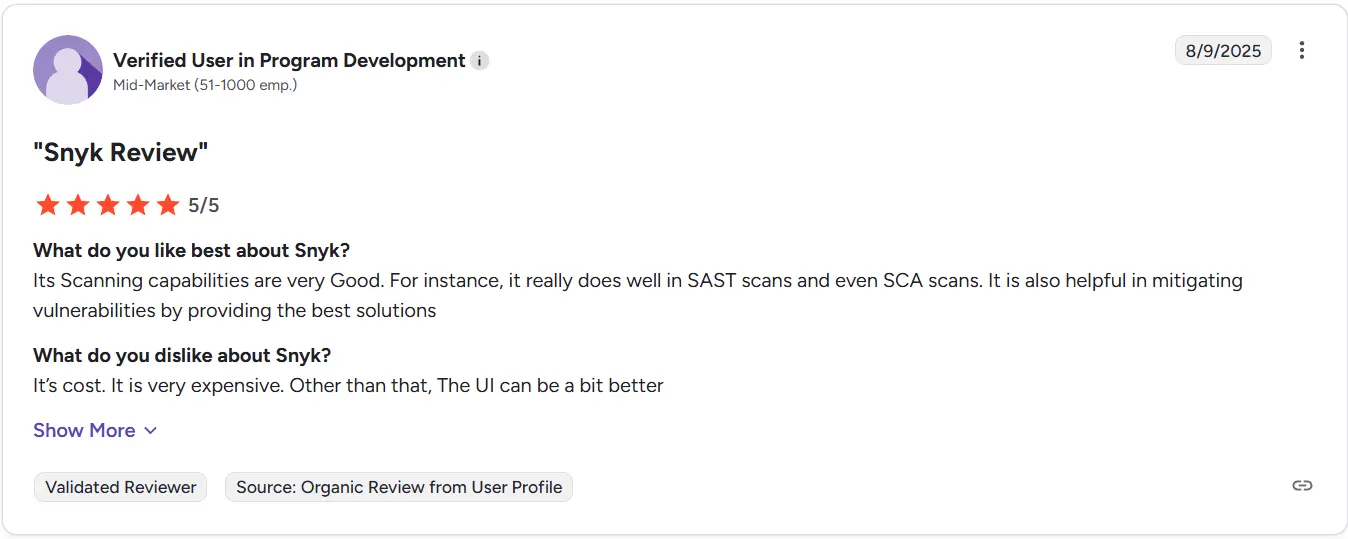
Source: G2
Snyk has an average rating of 4.6/5. Reviewers highlight its ease of use, especially for developers, and its wide range of integrations. Users appreciate the fast scan speeds and practical remediation guidance, which help reduce friction in development workflows. Some enterprise reviewers note that pricing can add up quickly at scale, but overall satisfaction remains high, particularly among engineering-driven teams.
SonarQube
SonarQube is another strong alternative to Checkmarx SAST, widely recognized for its dual focus on code quality and security. It scans source code for vulnerabilities, bugs, and maintainability issues, making it a favorite among development teams that want to enforce coding standards alongside security testing.
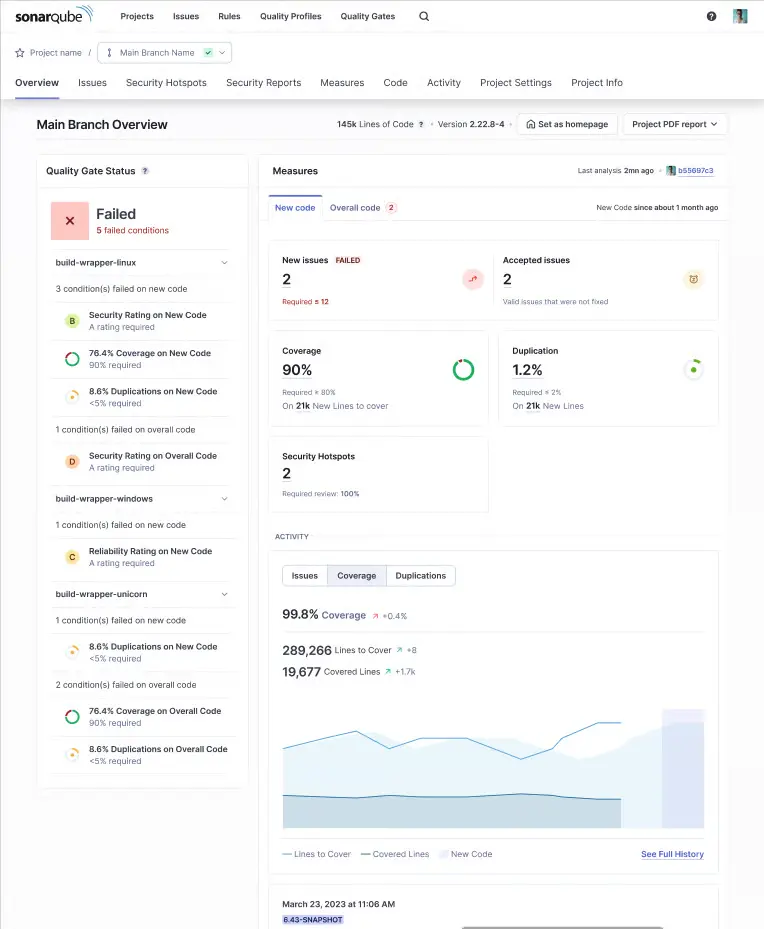
SonarQube comes in both open-source and commercial editions, making it accessible to small teams as well as large enterprises. The commercial editions add enterprise-focused features such as advanced governance, security reports, and compliance mappings.
Key features:
Source code scanning for vulnerabilities and code quality issues
Support for multiple programming languages
Integrations with popular CI/CD tools
Quality gates to enforce coding standards before releases
Open-source and commercial options available
Pricing:
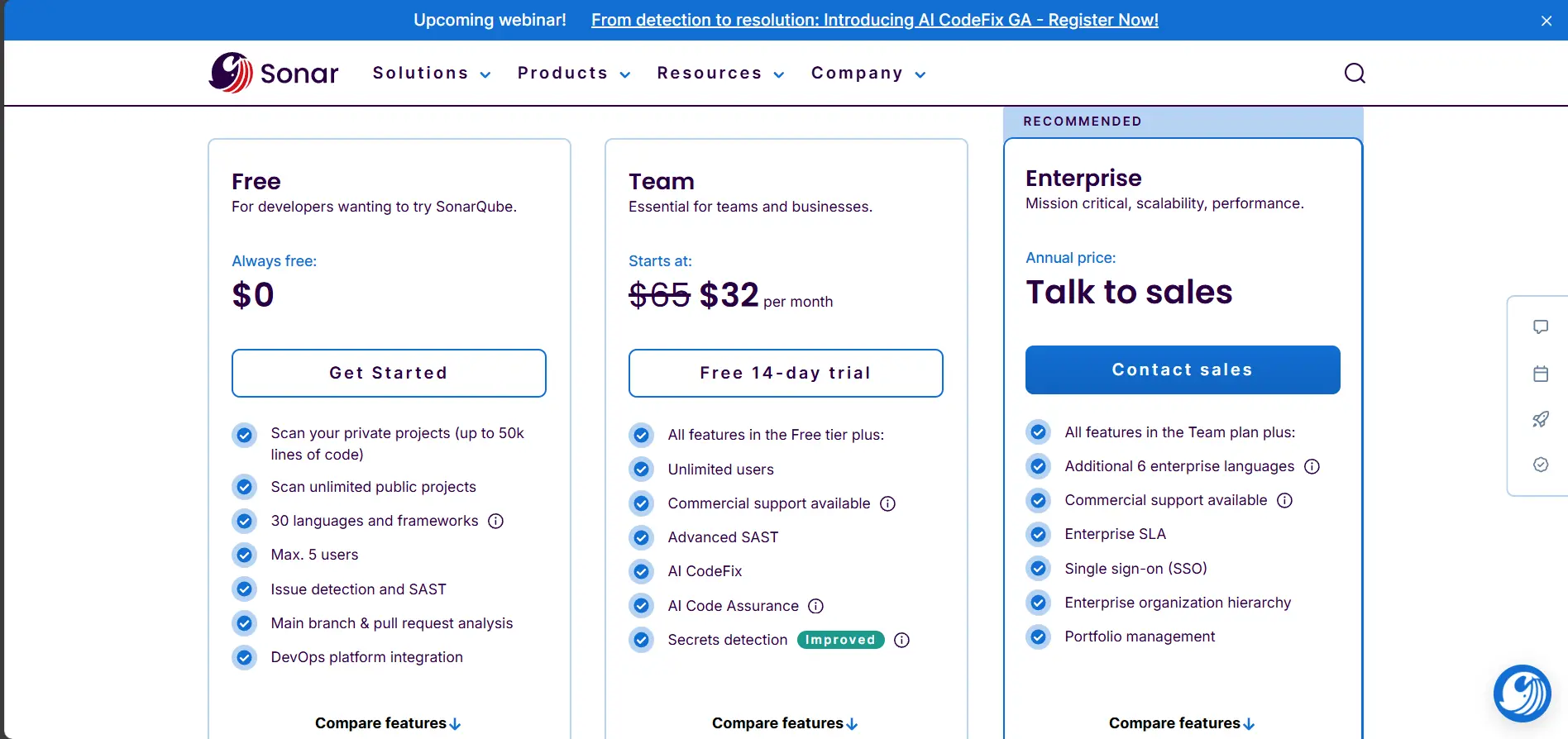
Free: $0 – Best for developers getting started, covers small private projects, unlimited public projects, and basic SAST.
Team plan: Starts at $32/month – Ideal for growing teams, includes unlimited users, advanced SAST, AI CodeFix, and commercial support.
Enterprise plan: Custom quote – Designed for large organizations, adds enterprise languages, SSO, SLA support, and portfolio management.
Ratings & review:
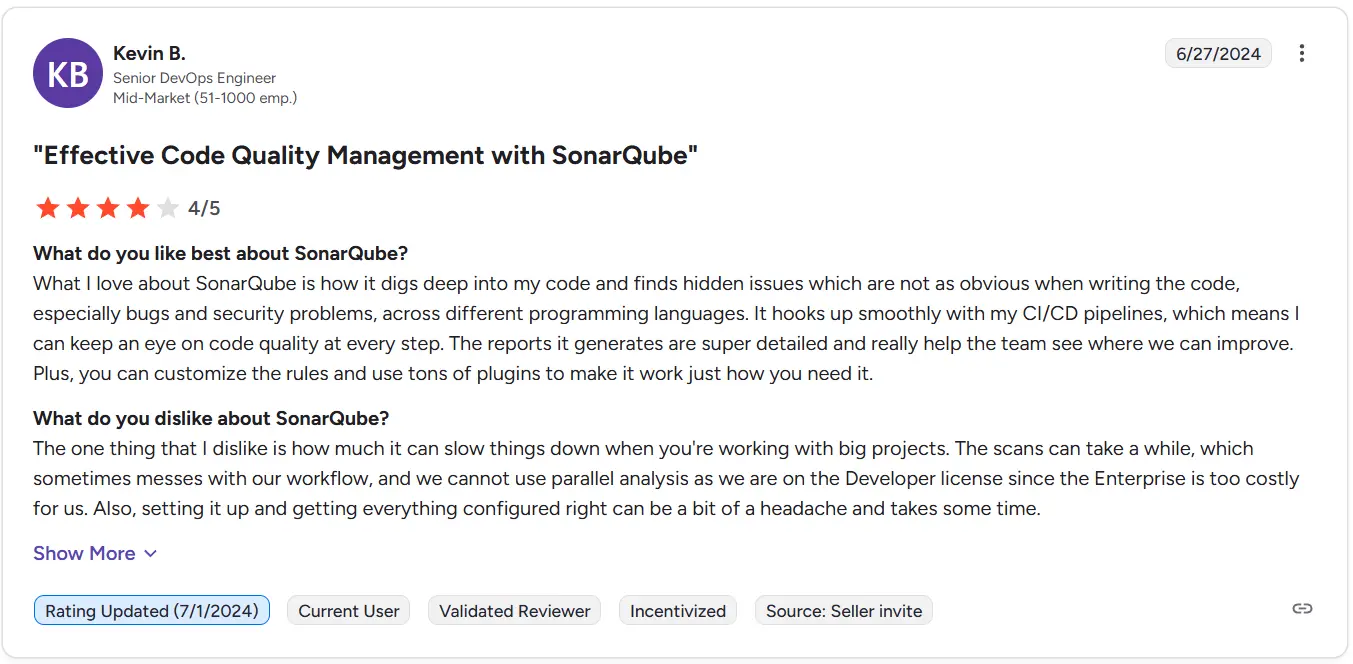
Source: G2
SonarQube holds a strong 4.5 out of 5 average rating on G2, reflecting its widespread adoption and value in improving code quality. Users consistently highlight its intuitive setup, robust language support, and seamless integration with CI/CD pipelines.
Checkmarx SCA alternatives
Checkmarx SCA overview: Strengths and limitations
Checkmarx Software Composition Analysis (SCA) helps organizations detect vulnerabilities and license risks in open-source dependencies. With the rising use of third-party libraries, SCA tools are critical for identifying and managing risks across the software supply chain.
Strengths:
Strong integration with Checkmarx SAST for unified reporting
Coverage across multiple package managers and ecosystems
Enterprise-grade compliance reporting
Limitations:
Slower updates compared to specialized SCA vendors
Licensing costs may be prohibitive for smaller teams
Reports can be complex without developer-friendly guidance
Because of these limitations, many organizations look for more agile and developer-focused SCA alternatives.
Mend.io
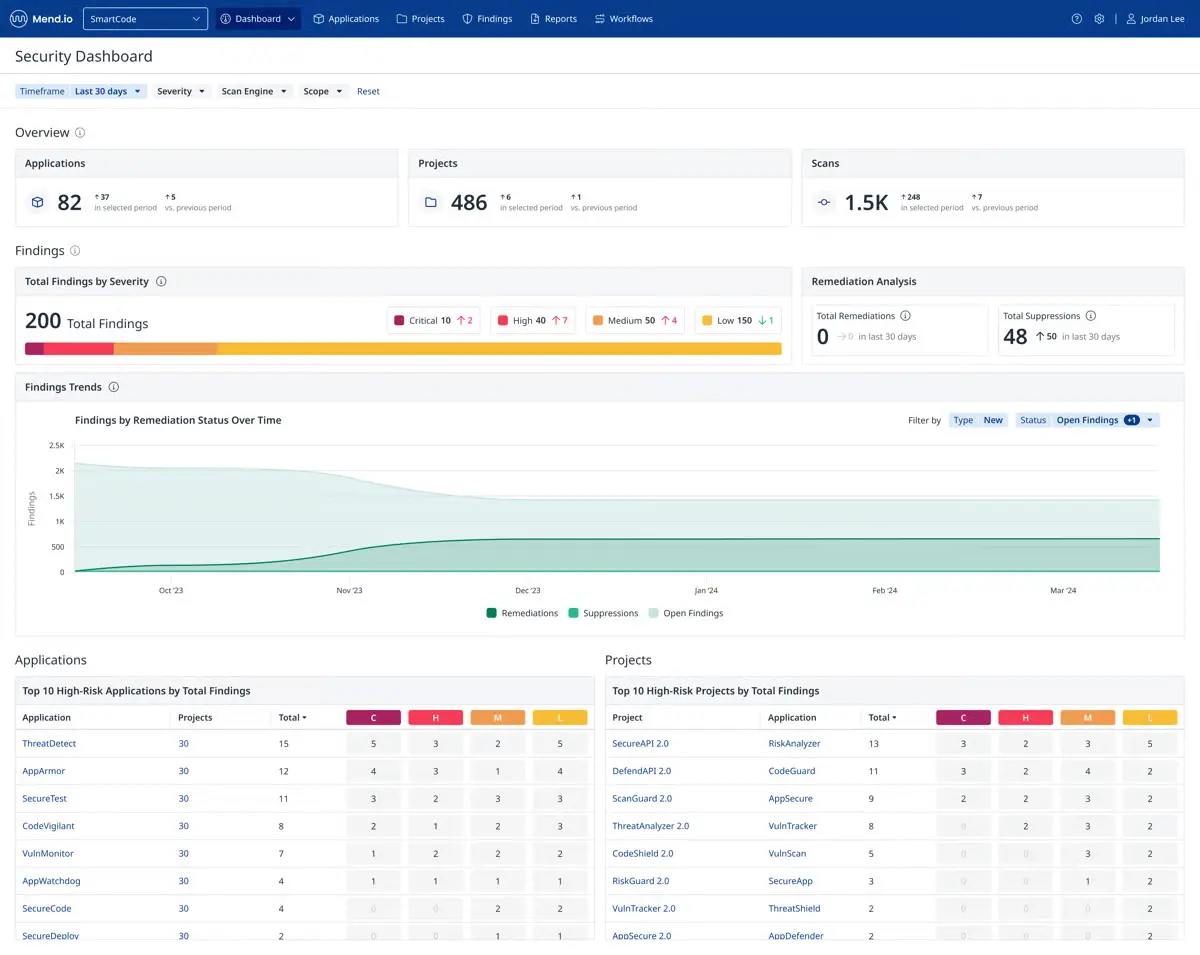
Mend.io (formerly WhiteSource) is a widely recognized SCA tool that provides deep visibility into open-source dependencies. It offers real-time vulnerability alerts, license risk management, and automated remediation workflows. Unlike Checkmarx SCA, Mend.io emphasizes automation and integrates easily into developer pipelines.
Key features:
Automated dependency scanning and risk alerts
License compliance management
Real-time vulnerability database updates
CI/CD integration for continuous monitoring
Policy enforcement to block risky dependencies
Pricing:
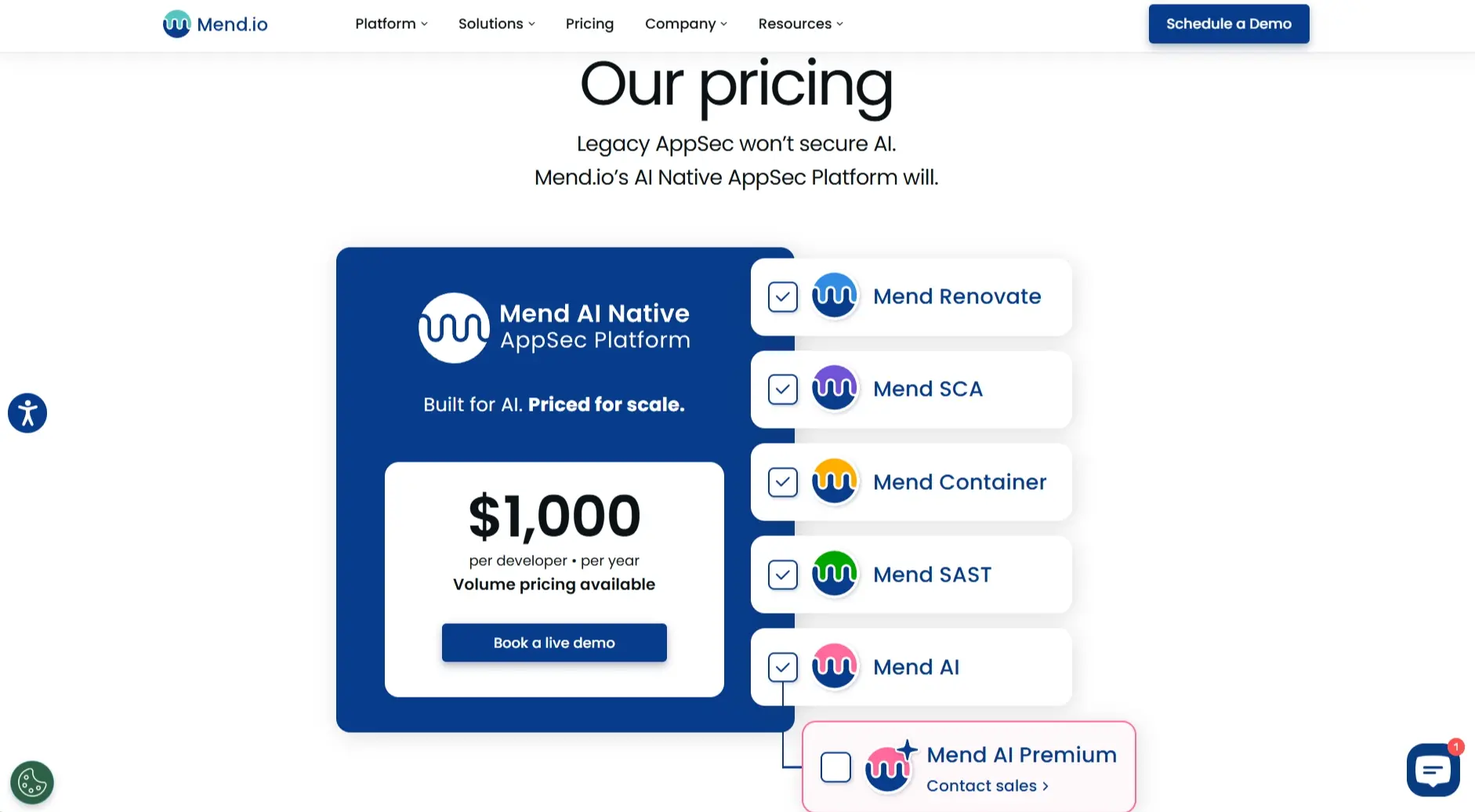
Source: AWS Marketplace
- Mend SCA Advanced: Annual cost of $16,000.
Ratings & reviews:
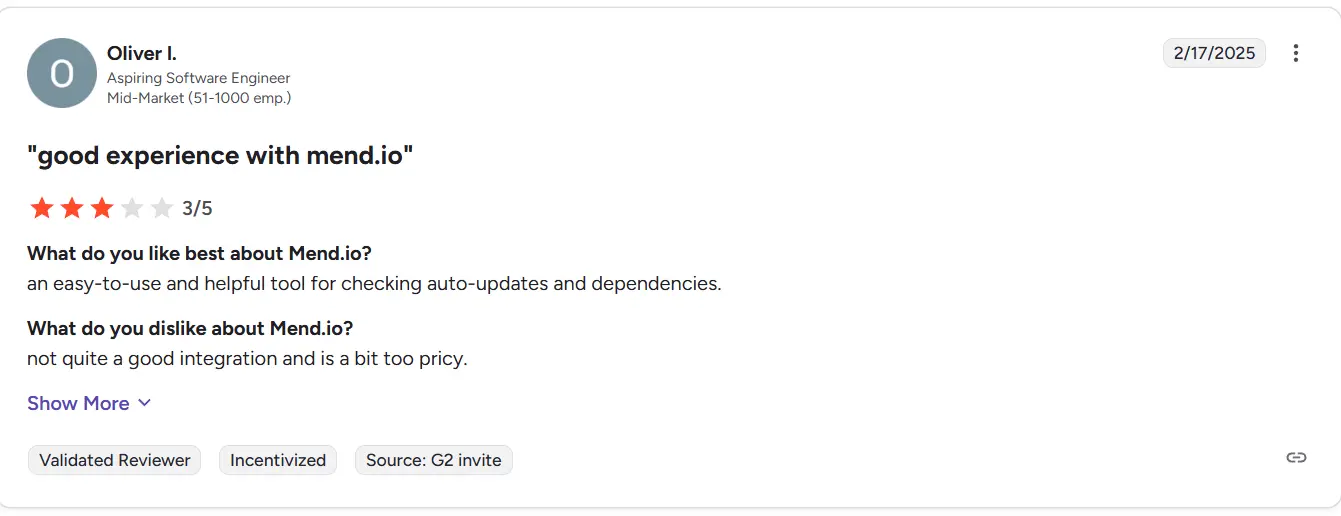
Source: G2
Mend.io has an average rating of 4.5/5. Users appreciate its ease of integration and automated risk management features. The license compliance management is often highlighted as a key differentiator. Some reviewers mention that large projects can produce overwhelming reports, but overall, Mend.io is valued for reducing the burden of managing open-source risk.
Veracode SCA
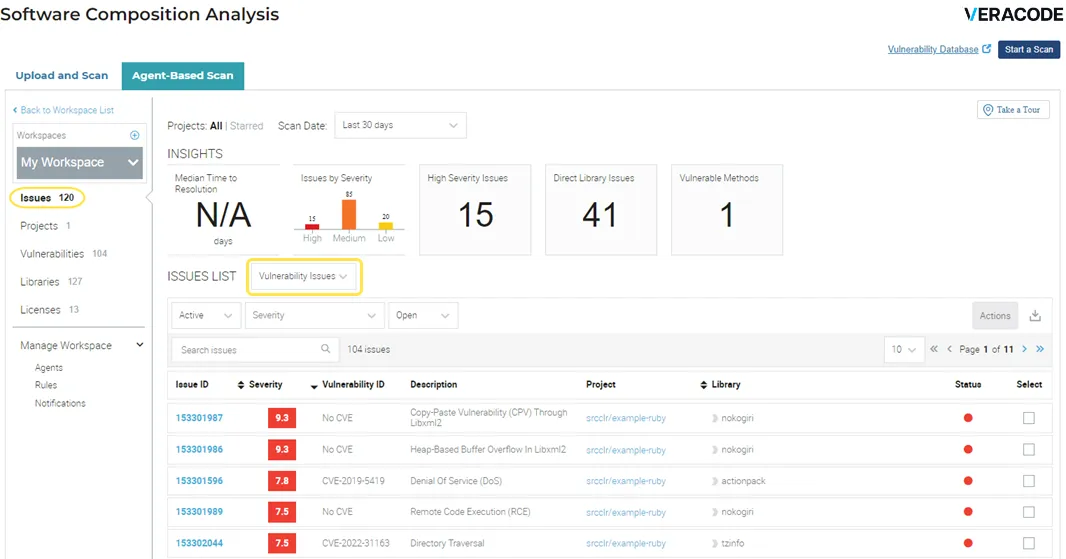
Veracode SCA is another enterprise-grade alternative, combining vulnerability scanning with compliance-focused reporting. It integrates tightly with Veracode’s broader application security suite, making it a strong choice for large organizations seeking centralized security governance.
Key features:
Comprehensive SCA with vulnerability and license risk detection
Integration with Veracode’s SAST and DAST tools
Policy enforcement and governance features
Compliance-ready reports for enterprise standards
Broad integration with CI/CD pipelines
Pricing:
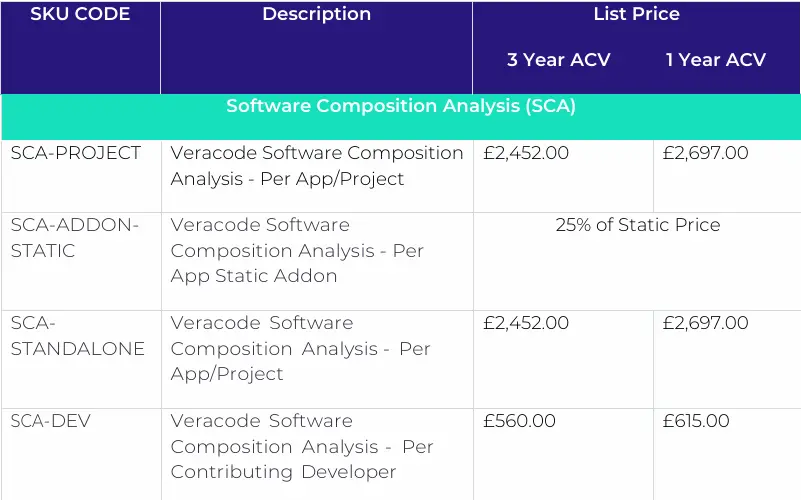
Source: gov.uk
- SCA-PROJECT: Annual cost of £2,697.00 for detailed open-source and third-party library analysis per application or project.
- SCA-ADDON-STATIC: Annual cost is 25% of the associated static analysis price, for adding composition analysis to an application’s static review.
- SCA-STANDALONE: Annual cost of £2,697.00 for dedicated software composition scans per app or project, independent from other services.
- SCA-DEV: Annual cost of £615.00 for full software composition oversight and risk monitoring per contributing developer.
Ratings & reviews (Source: Gartner Peer Insights):
Veracode SCA holds an average rating of 4.4/5. Customers value its enterprise-grade reporting and ability to support compliance audits. Some users note that it can be resource-intensive and may take time to configure in complex environments. Overall, it is trusted by large organizations that need a comprehensive, compliance-first approach.
Checkmarx IaC security alternatives
Checkmarx IaC security overview: Strengths and limitations
Checkmarx provides some coverage for infrastructure-as-code (IaC) security, helping detect misconfigurations in Terraform, Kubernetes YAML, and other infrastructure templates. However, its IaC capabilities lag behind specialized tools.
Strengths:
Integrated into the Checkmarx platform for unified visibility
Support for common IaC templates
Compliance-focused reporting
Limitations:
Limited coverage compared to specialized IaC scanners
Slower updates for emerging cloud-native standards
Not as developer-friendly for fast iteration cycles
Trivy
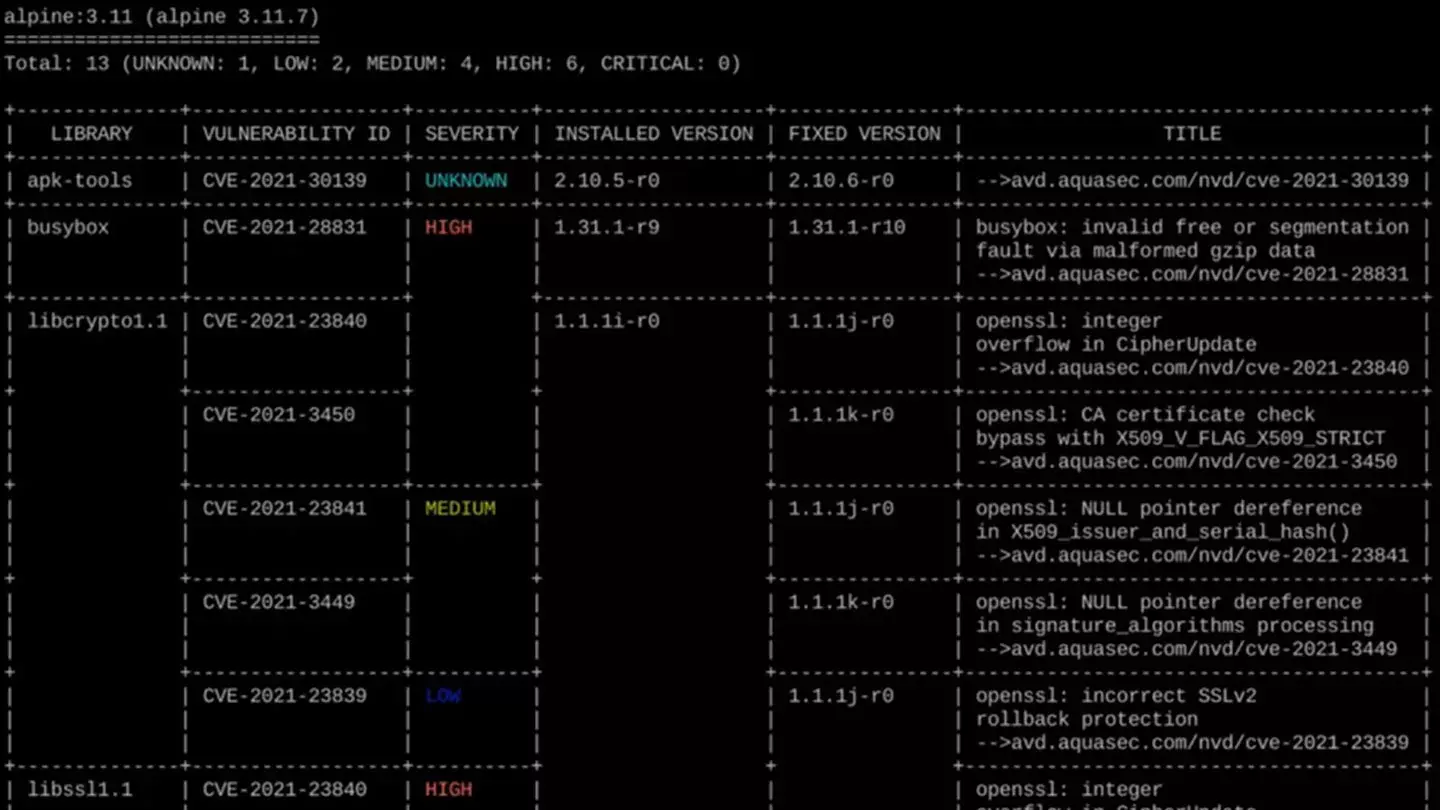
Trivy, an open-source scanner by Aqua Security, is one of the most popular IaC and container vulnerability scanners. It is lightweight, fast, and widely adopted among developers for local scans.
Key features:
Scans IaC templates for misconfigurations
Container image vulnerability scanning
Broad ecosystem coverage (Terraform, Kubernetes, Helm)
Free and open-source with active community support
CI/CD integration for automated scans
Pricing: Free (open-source). Enterprise options available via Aqua Security.
Ratings & reviews :
Trivy has earned widespread adoption in the open-source community with over 22,000 GitHub stars. Developers praise its simplicity, fast scans, and ability to handle multiple ecosystem integrations (containers, IaC, SBOM, and more). While some note that its reporting features are more basic compared to enterprise-grade tools, its lightweight and developer-friendly design makes it an ideal choice for modern DevSecOps workflows.
Checkov
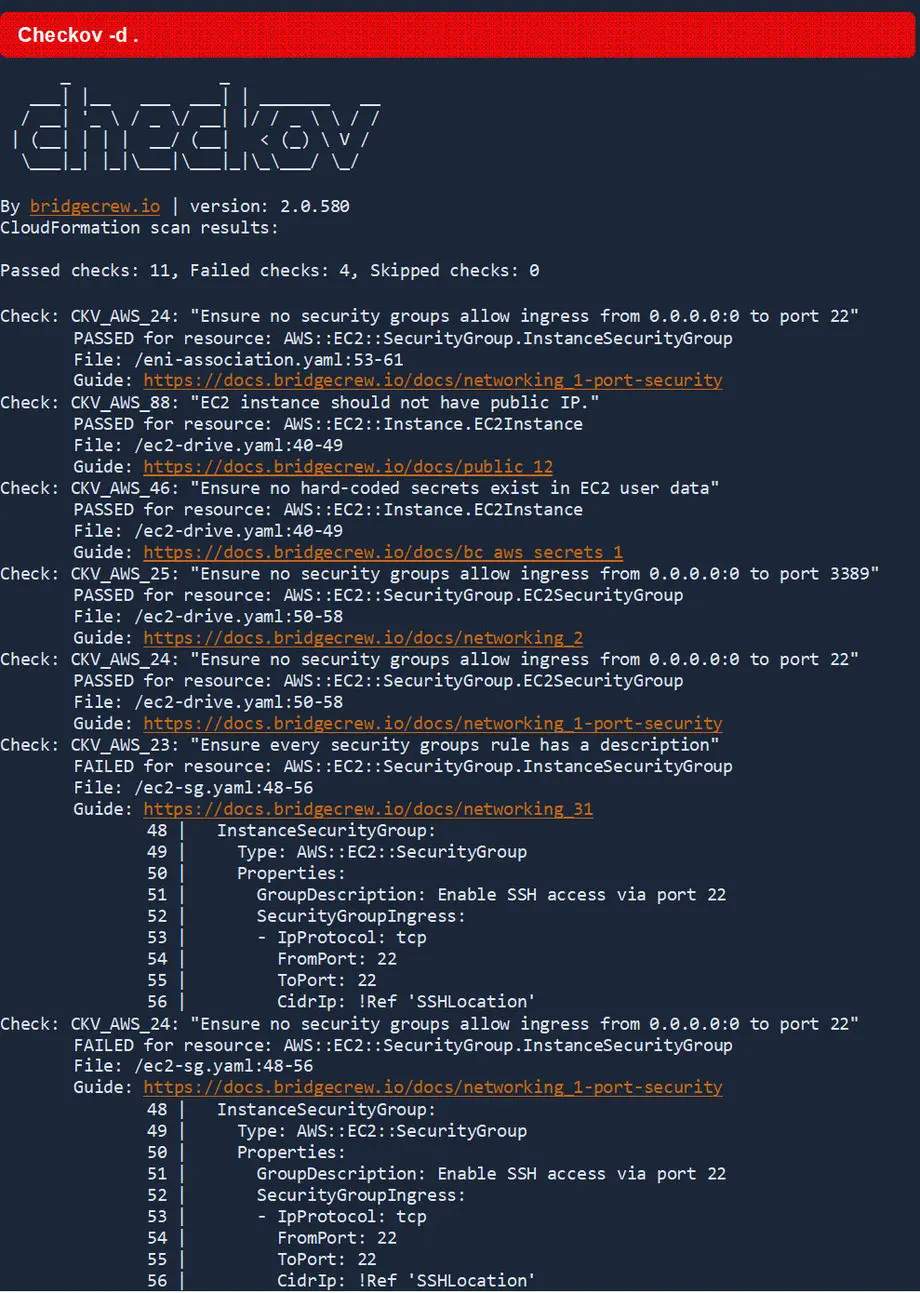
Checkov is another open-source tool that focuses specifically on IaC security. Maintained by Palo Alto Networks, it scans Terraform, Kubernetes, AWS CloudFormation, and other IaC frameworks for misconfigurations and compliance risks.
Key features:
IaC scanning with policy-as-code enforcement
Broad cloud provider support (AWS, Azure, GCP)
Integration with CI/CD pipelines
Strong community and open-source adoption
Extensible rules engine for custom policies
Pricing: Free (open-source). Prisma Cloud offers enterprise enhancements.
Ratings & reviews:
Checkov is highly regarded in developer and DevSecOps communities, especially for its extensive policy library and ability to scan Terraform, Kubernetes, and other IaC templates. Developers appreciate its integration with CI/CD pipelines and open-source flexibility. Some note that advanced reporting and enterprise-level support require commercial add-ons, but overall, it is considered one of the most reliable free IaC security tools.
Checkmarx container security alternatives
Checkmarx container security overview: Strengths and limitations
Checkmarx has some support for container security through integrations, but it is not as comprehensive as tools designed specifically for containerized environments.
Strengths:
Basic container scanning through integrations
Centralized reporting with other Checkmarx modules
Limitations:
Limited runtime protection
Lacks deep Kubernetes-native features
Higher costs compared to specialized providers
Aqua Security
Aqua Security is one of the leading names in container and Kubernetes-native security. It covers the full container lifecycle, from image scanning to runtime protection, and includes Kubernetes posture management.
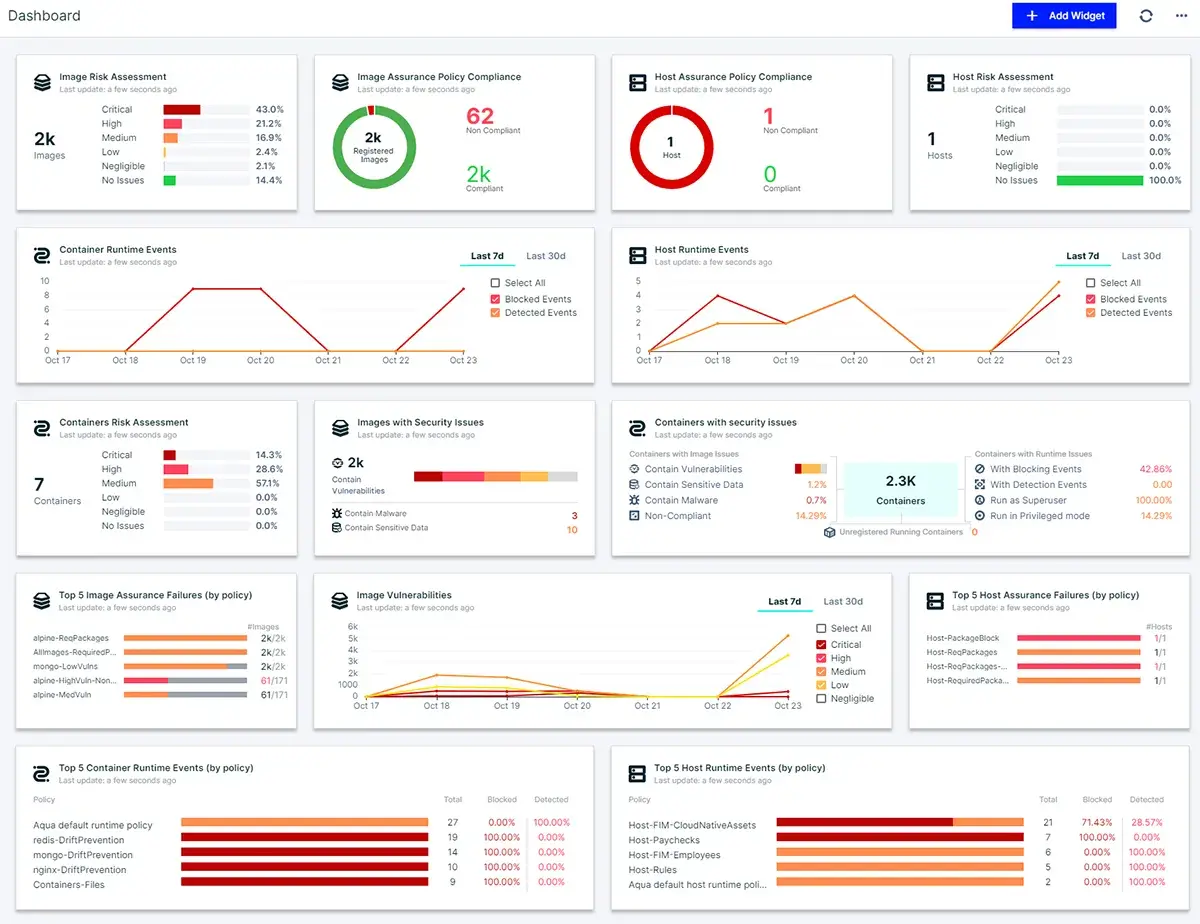
Key features:
Full lifecycle container security (build to runtime)
Kubernetes posture management (KSPM)
Integration with Trivy for vulnerability scanning
Runtime workload protection and AI/ML security
Supply chain protection features
Pricing:
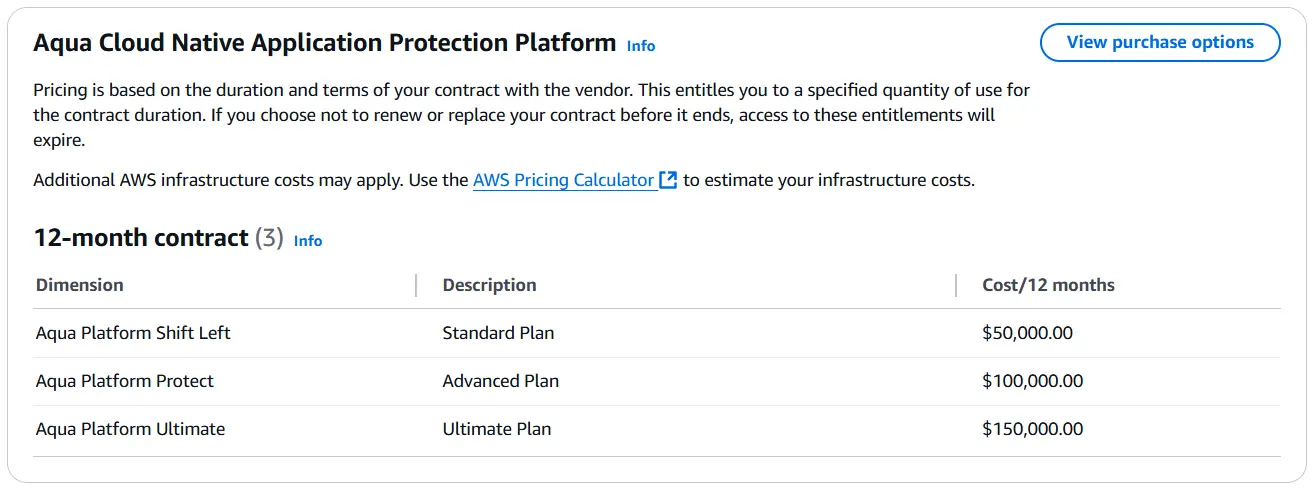
Source: AWS Marketplace
Shift left: Annual cost of $50,000.
Protect: Annual cost of $100,000.
Ultimate: Annual cost of $150,000, including enterprise-grade features.
Ratings & reviews:
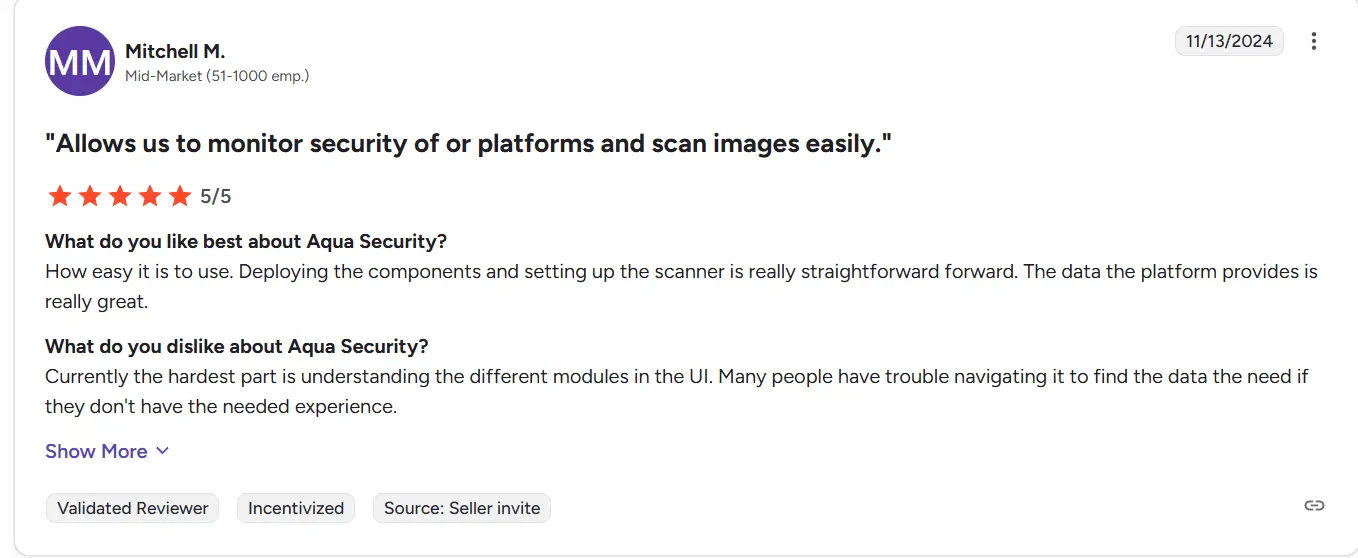
Source: G2
Reviewers consistently praise the platform’s ease of use, noting its straightforward deployment and intuitive dashboard. The depth of features across container and Kubernetes security is also frequently recognized, along with Aqua’s strong visibility into vulnerabilities and runtime threats
Lacework
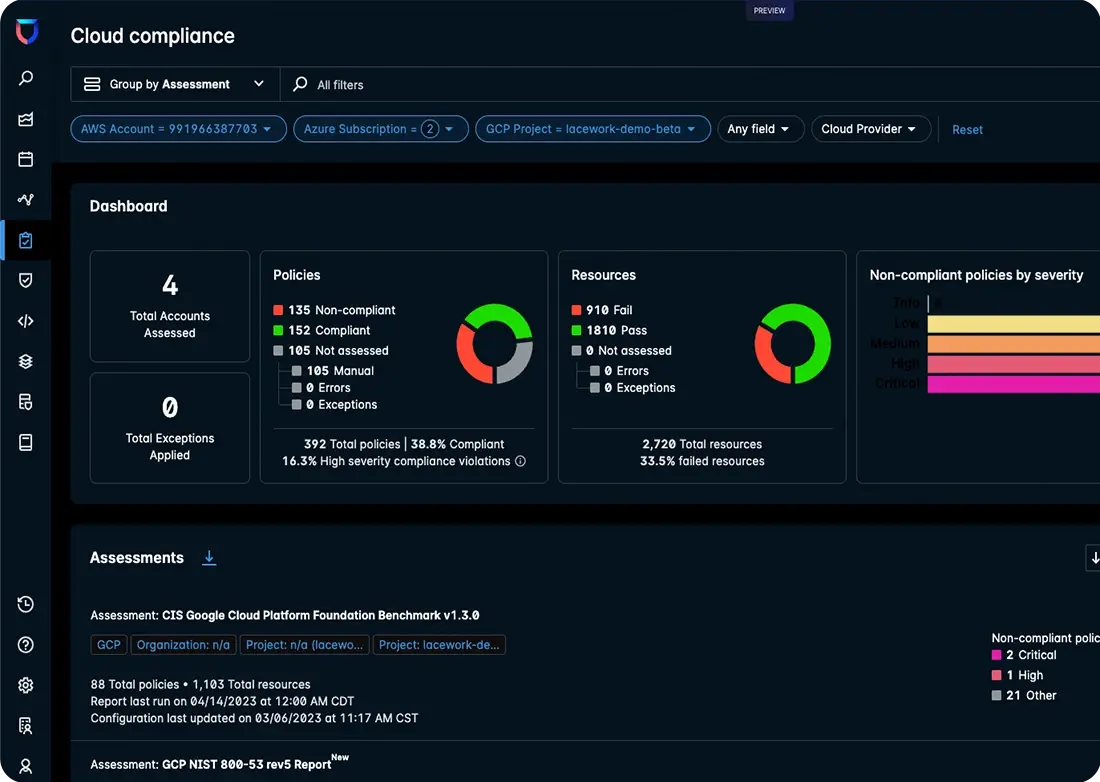
Lacework, now part of the Fortinet partner ecosystem, is another strong alternative, providing cloud-native container security with a focus on behavioral threat detection. Its platform uses machine learning to analyze container behavior and detect anomalies in real time.
Key features:
Cloud-native container security
Behavioral analytics for anomaly detection
Compliance reporting for multi-cloud environments
Runtime protection and automated alerts
Scales effectively in large enterprises
Pricing:
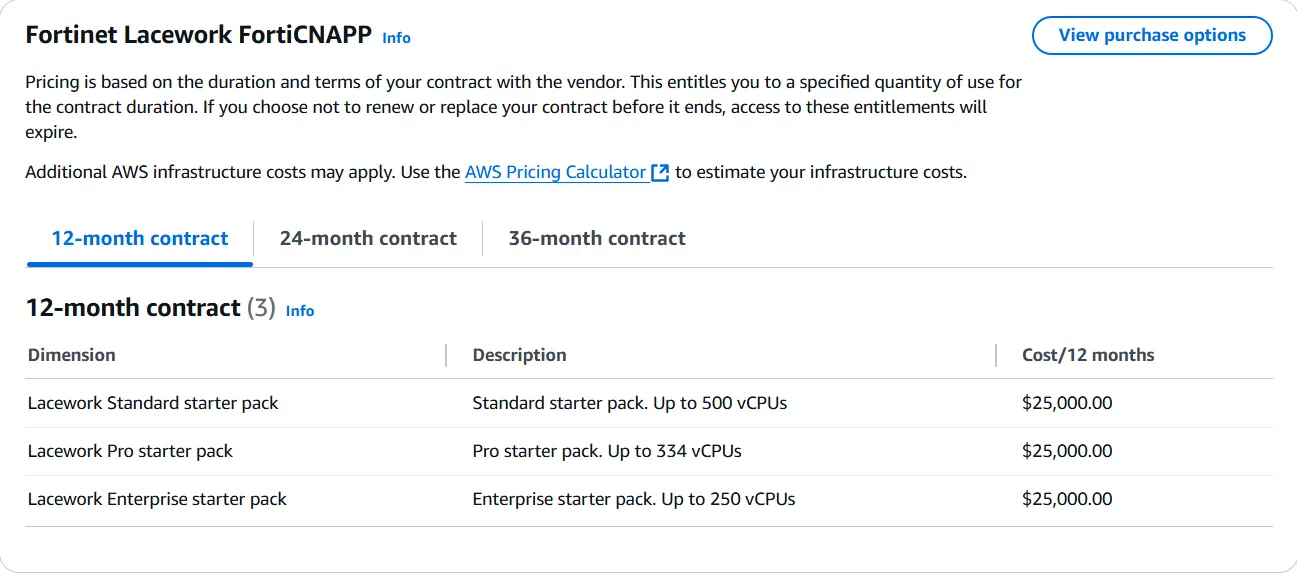
Source: AWS Marketplace
Standard starter pack: $25,000/year
Pro starter pack: $25,000/year
Enterprise starter pack: $25,000/year
Ratings & reviews:
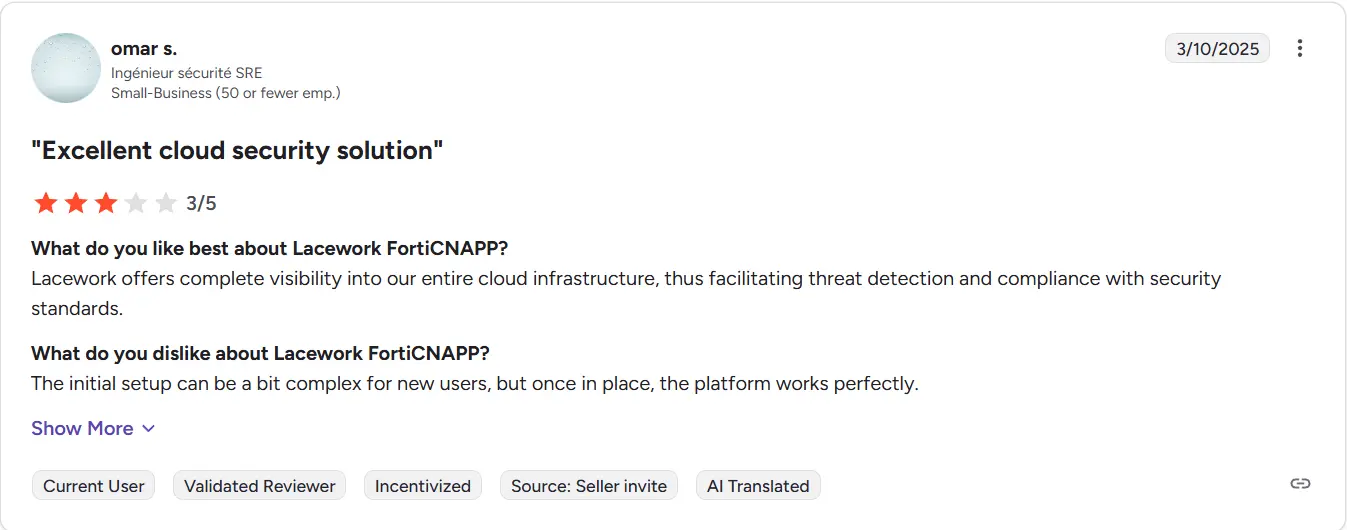
Source: G2
Lacework has an average rating of 4.4/5. Users praise its ability to detect anomalies in container workloads and its strong compliance features. Some reviews mention that the platform requires tuning for large-scale use, but it is widely regarded as a strong competitor in cloud-native security.
Checkmarx API security alternatives
Checkmarx API security overview: Strengths and limitations
Checkmarx offers limited API security features within its DAST toolset, but it lacks specialized capabilities for runtime API protection and discovery.
Strengths:
API scanning within broader DAST framework
Integration with Checkmarx platform
Limitations:
Lacks runtime API security features
Limited API discovery and behavioral analysis
Not ideal for modern, complex API ecosystems
Beagle Security (API focus)
Beagle Security extends its DAST capabilities into API security by supporting REST, GraphQL, and authenticated flows. It provides deep testing of API vulnerabilities while fitting seamlessly into CI/CD pipelines.
Key features:
REST and GraphQL API penetration testing
Authentication flow support
Business logic testing for APIs
Developer-friendly reports with remediation guidance
CI/CD integration for shift-left API security
Pricing: Starts at $119/month.
Ratings & reviews (Source: G2):
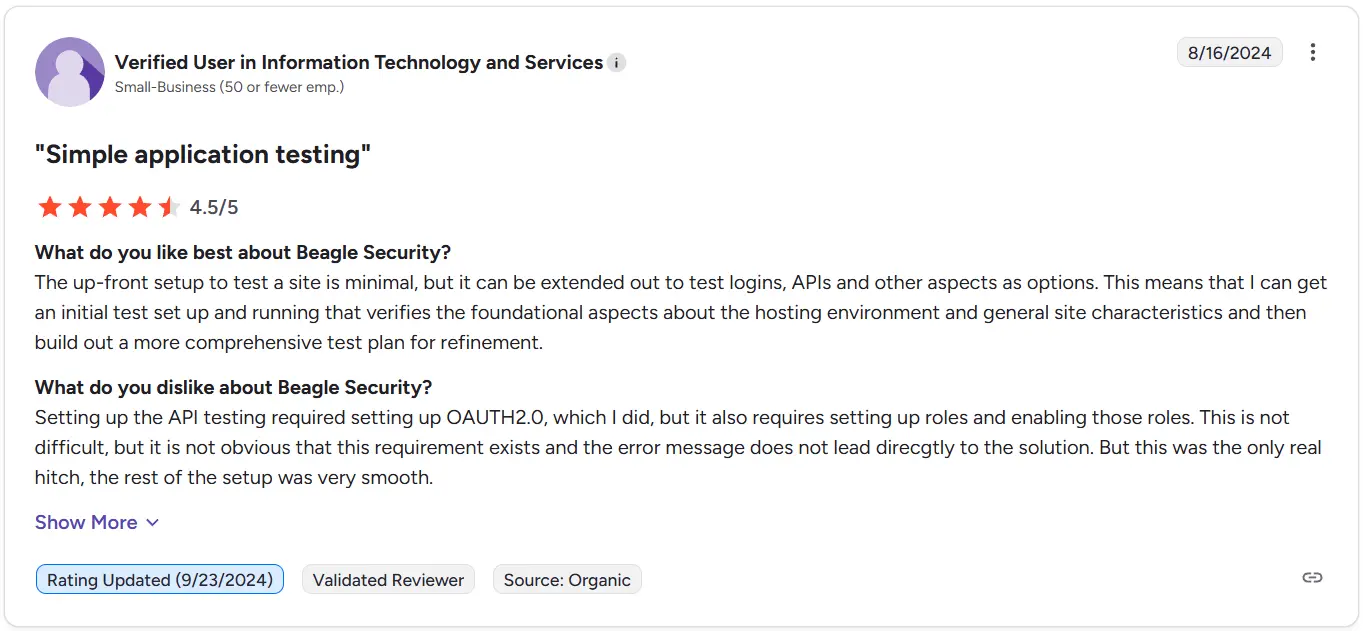
Beagle Security’s API testing capabilities are highly rated, with an average score of 4.7/5. Users highlight its ability to catch API-specific vulnerabilities often missed by other tools. Developers appreciate the stack-specific guidance, while some enterprise reviewers note that very large API ecosystems may require fine-tuning.
Traceable AI
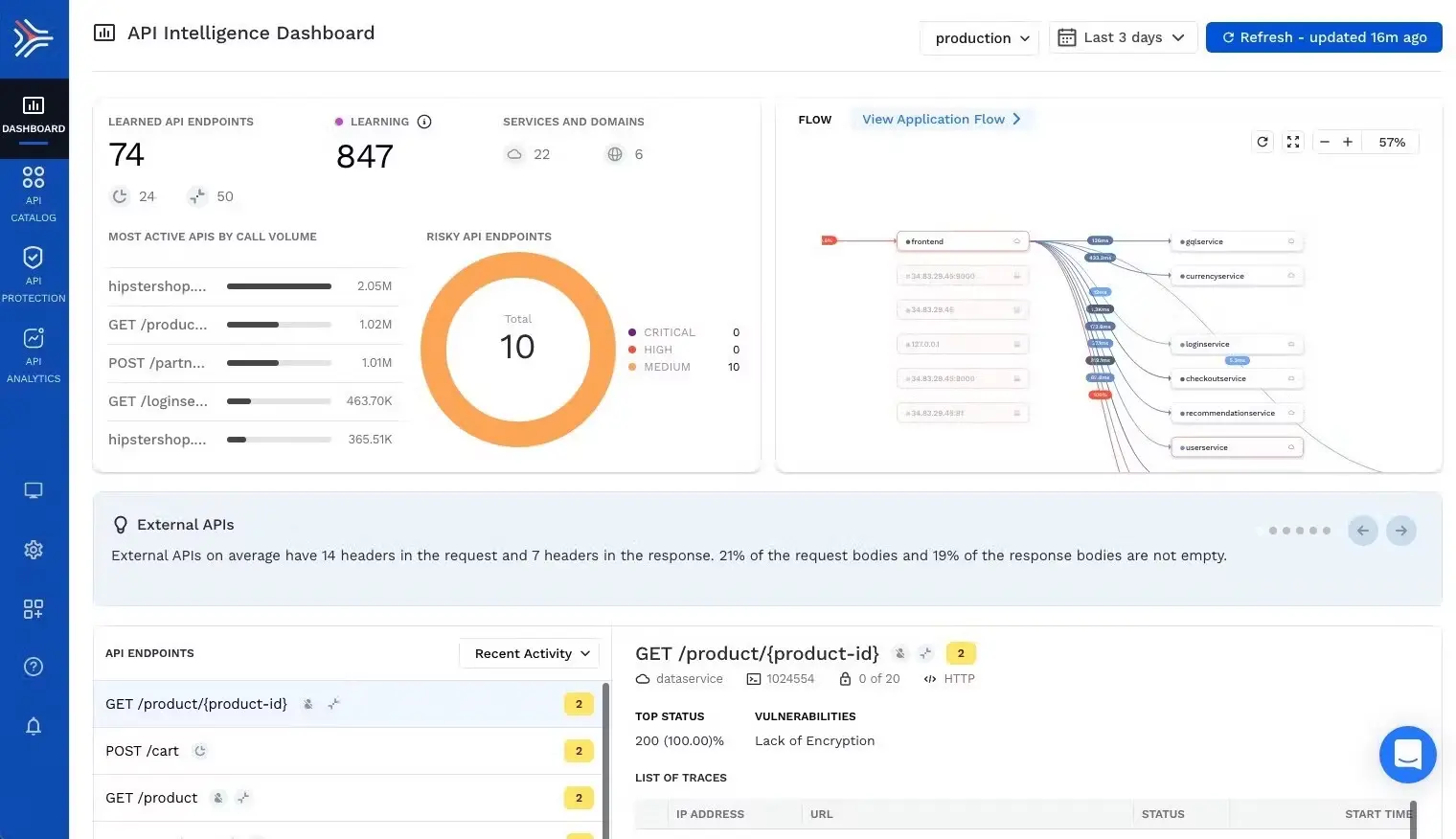
Traceable AI is a dedicated API security platform focused on runtime API protection. It automatically discovers APIs in an environment, monitors their behavior, and detects threats in real time.
Key features:
Automatic API discovery
Runtime protection against API-specific attacks
Behavioral analysis using machine learning
Data classification and compliance monitoring
Integration with enterprise SIEM and security tools
Pricing:

Source: AWS Marketplace
Discovery: Annual cost of $20,000
Protection: Annual cost of $70,000
Ratings & reviews:
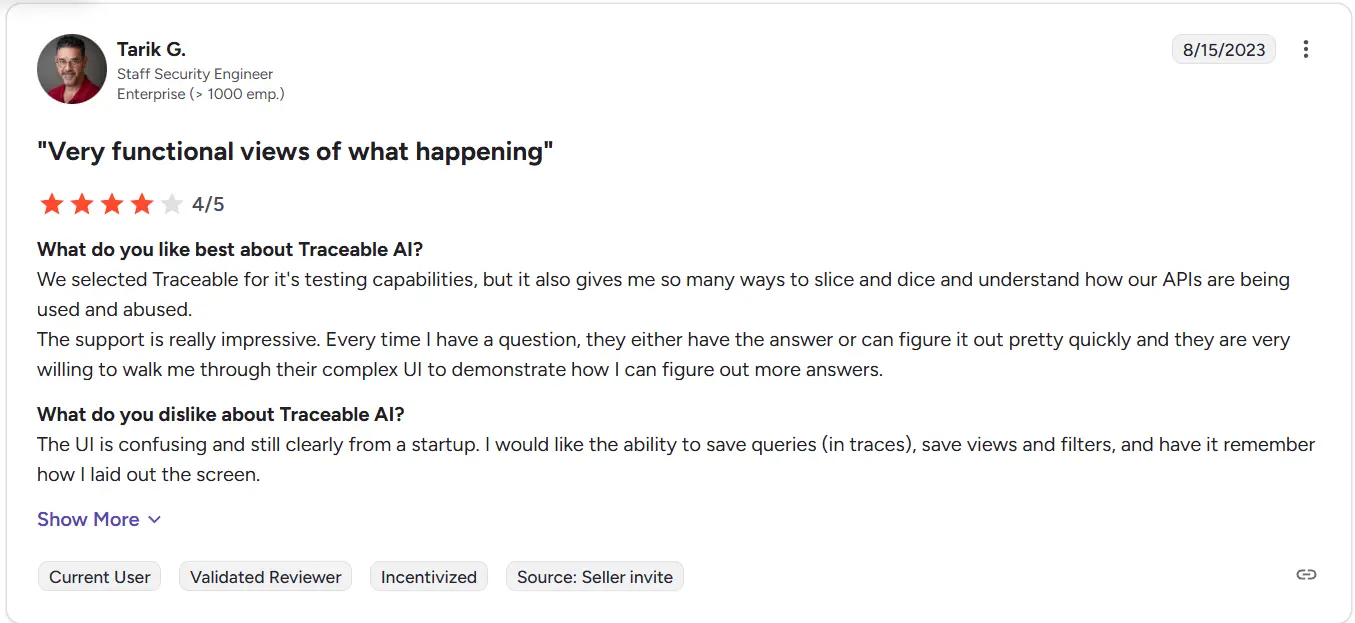
Source: G2
Traceable AI holds an average rating of 4.7/5. It is widely regarded for its depth in API traffic insight and strong support responsiveness. While users appreciate its comprehensive API threat visibility and tooling integrations, they also call for improved UI usability and deeper maturity in certain feature areas.
Key factors to consider when choosing a Checkmarx alternative
When evaluating Checkmarx alternatives, organizations should consider:
Specific use case: DAST (Beagle Security, Invicti), SAST (Snyk, SonarQube), SCA (Mend.io, Veracode), IaC (Trivy, Checkov), Containers (Aqua, Lacework), APIs (Beagle Security, Traceable AI)
Integration capabilities: Look for CI/CD and IDE integrations that support developer workflows
Scalability: Ensure the solution can grow with your applications and infrastructure
Ease of use: Developer-first tools often reduce friction and improve adoption
Reporting and compliance: Executive dashboards and compliance mappings are critical for audits
Budget: Open-source tools like Trivy and SonarQube offer affordability, while enterprise tools like Aqua and Invicti provide depth at higher cost
Final thoughts
Checkmarx continues to be a respected player in application security, but in 2025, many organizations find value in specialized alternatives that better align with their needs.
For modern web apps and APIs, Beagle Security is an excellent choice.
For large-scale DAST, Invicti offers enterprise-grade proof-based scanning.
For developer-first SAST, Snyk and SonarQube are strong contenders.
For managing open-source risk, Mend.io and Veracode SCA deliver reliable results.
For IaC scanning, Trivy and Checkov provide lightweight and policy-as-code approaches.
For container-heavy environments, Aqua Security and Lacework are trusted solutions.
For API security, Beagle Security and Traceable AI stand out.
The best choice ultimately depends on your security priorities, budget, and development workflows. Organizations should align their tools with their security maturity to ensure strong coverage without creating unnecessary complexity.
FAQs: Checkmarx alternatives and competitors
Q1. Why should organizations look for Checkmarx alternatives?
Because of high costs, slower developer workflows, and the need for specialized security solutions.
Q2. What is the best Checkmarx alternative for DAST?
Beagle Security for developer-first workflows, or Invicti for enterprise scalability.
Q3. Which is the top Checkmarx alternative for SAST?
Snyk is best for developer teams, while SonarQube is great for balancing security and code quality.
Q4. What is the most affordable Checkmarx alternative?
Open-source tools like Trivy and SonarQube Community edition are free and widely adopted.
Q5. Which Checkmarx alternative excels in API security?
Beagle Security for testing and Traceable AI for runtime API protection.
Q6. Do Checkmarx alternatives support CI/CD pipelines?
Yes, most modern tools like Beagle Security, Snyk, Trivy, and Mend.io integrate seamlessly into CI/CD workflows.
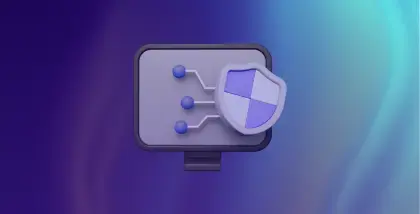


![Acunetix vs Nessus: Which is right for you? [2026] Acunetix vs Nessus: Which is right for you? [2026]](/blog/images/acunetix-vs-nessus-which-is-right-for-you-2026-cover.webp)
![OpenVAS vs Nessus: Which is the best choice for you? [2025] OpenVAS vs Nessus: Which is the best choice for you? [2025]](/blog/images/openvas-vs-nessus-which-is-the-best-choice-for-you-2025-cover.webp)


![Top enterprise application security tools [2026] Top enterprise application security tools [2026]](/blog/images/blog-banner-four-cover.webp)
![Top vendor application security testing tools [2026] Top vendor application security testing tools [2026]](/blog/images/blog-banner-six-cover.webp)
![Best API security tool for developers [2026] Best API security tool for developers [2026]](/blog/images/blog-banner-five-cover.webp)

![Top Bright Security alternatives [2026] Top Bright Security alternatives [2026]](/blog/images/blog-banner-one-cover.webp)